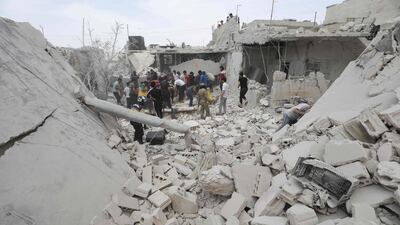When the UN Security Council met to discuss Syria this week, Bashar Al Assad's planes had already spent a month bombing Idlib. With the casualties mounting the aim of world powers was to stop a massacre whose numbers would rival Aleppo.
“Too many people have been killed already and we need to see an end to the fighting,” Geir Pedersen, the UN secretary general's special envoy, said afterwards, calling for a ceasefire.
At least three million civilians, including one million children, are in the area under attack.
Idlib is again showing the weaknesses of the Security Council when it comes to confronting Syria's president. Despite talk of political solutions the past eight years have shown that military power prevails. The regime is willing to use it, whatever the human cost.
The perversity of the war is manifest: barrel bombs are being dropped into what is misleadingly called a de-escalation zone. Several diplomats compared the battleground to scenes from Game of Thrones.
The protagonists in Syria's real life and death drama justify the bombing as a necessary measure against Hayat Tahrir Al Sham, a group dominated by former members of Al Qaeda's Syria affiliate which is on the UN terrorism list, and which controls Idlib province.
But with the exception of Russia, Mr Al Assad's existential ally, all countries said the force being used is disproportionate. At least 22 hospitals have been hit in air strikes in the past month, each constituting a breach of international humanitarian law. And yet it goes on.
Mr Pedersen, a Norwegian diplomat, has been in the job six months. He started well, restarting talks with the Syrian government as well as the opposition and other key parties. Some prisoners have been released and attempts have been made to unify international efforts for a political settlement.
But Idlib is showing his limitations and the need for a stick when it comes to dealing with Syria's president. The regime's fight to reclaim Aleppo, lost to rebels in 2012 and Syria's largest city before the war, lasted from late 2015 to December the following year. Intense air strikes put all hospitals out of action and thousands of civilians died in a battle of attrition.
Among those who attended the Security Council on Wednesday was James Jeffrey, the White House's special representative on Syria. Mentioning Secretary of State Mike Pompeo's trip to Moscow earlier this month, he indicated that the US and Russia might have “a potential way forward” to end the war.
The problem is that it involves Mr Al Assad making compromises in return for political acceptance.
“The attack on civilians, particularly those who are trying to care for others is abhorrent. It has to stop immediately,” Mr Jeffrey said of the targeting of hospitals.
It won't, without a ceasefire.
Syria long ago became an amorphous theatre of conflict to which a political settlement seems far off. Idlib is reminding us just how hard ending the war will be. But after years in the shadows the US appears to be stepping up its engagement.
Mr Jeffrey suggested that new sanctions are under consideration.
“What we are looking at now is a set of primarily economic and diplomatic steps that will continue to keep this regime under pressure, and as long as the Idlib situation continues we will look for ways to heighten that pressure,” he said.
In Russia Mr Pompeo discussed a plan that "would allow a Syrian government that adheres to [UN resolution] 2254 to move back into the international community," said Mr Jeffrey.
But "so far we haven't seen steps such as a ceasefire in Idlib, the convening of a constitutional committee that would give us confidence that the Assad regime actually understands what it must do to end this conflict".
The US, which once demanded that Mr Al Assad stand down, has stopped calling for that but Mr Jeffrey's remarks indicate an offer of incentives to help advance prospects for a peace settlement.
"This is going to take hard decisions – hard decisions not only by us, but hard decisions by the Russians and hard decisions most of all by the Syrian regime," he said.
The question is whether Mr Al Assad cares or can be persuaded before Idlib is wiped off the map.

